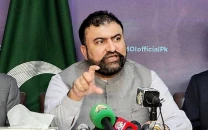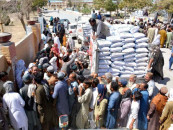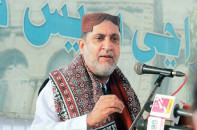Amnesty for Baloch militants — will it work?
It is high time the federal government paid more than lip service to the needs of the province

The writer is a freelance journalist and a former reporter at
The Express Tribune. He is based in Balochistan and tweets @shezadbaloch
At a recent meeting of the Apex Committee, it was announced that money would be paid to those currently waging war against the state from mountain hideouts on the condition that they surrender their arms. The announcement came on the heels of the increasingly frequent attacks, which have claimed more than 50 lives. In an earlier statement, Chief Minister Dr Abdul Malik Baloch had said that, apart from the districts of Turbat, Panjgur and Awaran, the province was relatively peaceful. However, the sharp rise in incidents of violence in Quetta, Mastung and other parts of the province has compelled the political leadership to admit the ground reality and redouble its efforts to weaken militancy. The resurrection of the old strategy of giving incentives to militants is a part of these efforts. To date, however, the only big-name militant known to have laid down arms and surrendered is Kalati Marri, the commander of the banned United Baloch Army.
The recent surrenders and the question of who can claim credit for them, has become a hot-button issue in the run-up to the election of a new chief executive of Balochistan, a position likely to become vacant in the next couple of months under a pact agreed to by all major political parties. Two heavyweight figures, PML-N leader Nawab Sanaullah Zehri and Nawab Jangez Marri, have emerged as strong candidates but, given Balochistan’s unpredictable political climate, the eventual outcome remains uncertain. Kalati’s surrender was facilitated by Jangez Marri whereas Nawab Sanaullah Zehri is making every effort to bring the Khan of Kalat, Prince Agha Suleman Dawood, back from self-imposed exile in London.
Currently, there are three key Baloch leaders living in self-imposed exile — Baloch Republican Party chief Nawabzada Bramdagh Bugti, alleged BLA chief Nawabzada Harbyar Marri, and alleged head of the Lashkar-e-Balochistan Javed Mengal. Their influence is primarily felt in Khuzdar, Dera Bugti, Kohlu, Makran and Nasirabad divisions, but it also extends to Quetta and other parts of the province. So far, there has been no attempt to reach these leaders. Another key player — and the only militant leader currently in Balochistan — is Dr Allah Nazir, head of the banned Baloch Liberation Front, the organisation responsible for attacking security forces and construction sites in Makran division. So far, he has refused to talk to the government. The only leader at all likely to be persuaded to return is the Khan of Kalat. However, his potential usefulness to the National Party in putting an end to militancy is limited, given his lack of involvement in the armed struggle.
A senior military official has stated that the proposed pardon and rehabilitation policy should be announced with immediate effect and that a committee charged with making contact with leaders living in self-imposed exile in the West should be established. In the event that the proposed negotiations fail, the likelihood that security forces will get involved is high. However, the success of any military action cannot be guaranteed given that these actions in the past have had a negative impact on the political environment.
Why does the armed struggle continue to enjoy some support among certain sections of the population? The answer to this question is apparent to anyone visiting Balochistan. Vast areas of the province have very little in the way of infrastructure, healthcare or educational facilities. Those who contend that tribal chieftains are to blame for this backwardness should ask themselves why there is no development in areas under the control of the pro-government sardars, since they have always enjoyed the backing of the establishment. It is high time the federal government paid more than lip service to the needs of the province. The people of Balochistan complain, and rightly so, that they have a very limited stake in the election of their representatives. These ‘elected representatives’ do little more than serve their own interests. The government must stop repeating the mistakes of past decades. Balochistan, with its vast areas of harsh, mountainous terrain so suited to harbouring militants, has been in a state of almost relentless conflict for the past three centuries. Its people need more than temporary relief. They need a permanent cure to their woes.
Published in The Express Tribune, July 9th, 2015.
Like Opinion & Editorial on Facebook, follow @ETOpEd on Twitter to receive all updates on all our daily pieces.



















COMMENTS
Comments are moderated and generally will be posted if they are on-topic and not abusive.
For more information, please see our Comments FAQ